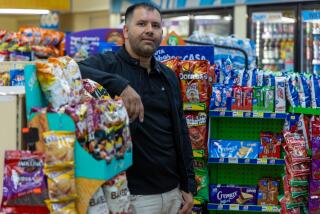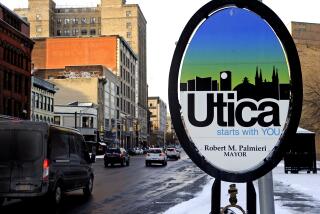One Mother’s Plight Moves First Lady
- Share via
BRAZDA, Macedonia — For everyone who visits the refugee camps of Kosovo Albanians, there comes a moment when it becomes clear what it would be like to go through what the refugees have endured.
For Hillary Rodham Clinton, that moment came outside Tent B-12 in a camp here Friday, when 42-year-old Fetije Pronaj, a worn-faced woman with collar-length dark hair, told her story.
She came from a small village north of Pristina, the capital of the besieged southern Serbian province of Kosovo. When Serbian forces emptied her village, they herded everyone onto trains. As she stood on the station platform, she held tight to her 8- and 11-year-old sons’ hands while her husband looked after her three older daughters.
“Then they began to separate the women from the men--they were pointing guns at us,” she said.
Suddenly, in the crush of the crowd and the shoving of the soldiers, she lost her sons’ hands, she could not see them anywhere, and she was pushed onto the train.
Pronaj is now in Macedonia’s Stenkovec I refugee camp with only two of her daughters. It is unclear where her husband and other three children are.
Clinton heard Pronaj’s story Friday morning on her trip to Macedonia, which was aimed at highlighting the plight of ethnic Albanian refugees from Kosovo and assuring this poor Balkan nation that the United States understands the stress that the influx has placed on it.
Aid officials say Macedonia has taken about 233,000 of the nearly 800,000 refugees who have fled Kosovo since NATO started bombing Yugoslavia on March 24.
Clinton also announced the release of the first $2 million in a $21-million economic development package for Macedonia that is designed to help the fledgling democracy create new small businesses .
“I want very clearly to express our appreciation to the government and the people of Macedonia for the steps they have taken in responding to this unprecedented crisis,” she said.
While Clinton was enthusiastic during her meeting with Macedonian President Kiro Gligorov, Prime Minister Ljubco Georgievski and others, it was only during her tour of refugee camps that her practiced politician’s manner fell away.
As she started to leave the camp of 23,000, which was hot and dusty and smelled of sweat and sewage, she spontaneously started to talk to the assembled crowd of aid workers and journalists.
“I’m picturing myself in the faces and stories,” said Clinton, and then it was Fetije Pronaj’s face that seemed to appear before her.
“When you talk to a woman, who in the push of the crowd with the Serbian police . . . forcing people onto those trains, the hands of the children she was holding evaporate--all of us have had that experience where you are holding onto a little hand and it gets hot in a football crowd or some other place,” she said.
“And now, she doesn’t know where three of her children are, she has no idea whether they are in Kosovo, whether they were put on a later train, she has no idea what has happened to them,” Clinton said, shaking her head slightly.
Later, Pronaj told a Times reporter that she believes her three children are with her husband in Pristina, but it was unclear why she thought that--except that some people from her town were still in Pristina. In the world of refugees, such fragments of information become lifelines.
Pronaj, like several refugees with whom Clinton spoke, said she was happy and surprised by her visit.
“She came very close to us and she heard our stories. We’re very glad she came and heard us,” said Pronaj, sitting amid her two eldest daughters and half a dozen other family members.
In a neighboring tent, Ziza Shehu, 27,, also talked with Clinton. For her, the visit was like a briefly opened window. “When she came to our tent, I was very happy--it was like peace came in,” said Shehu, smiling gently.
But then, the visit was over. “Now I feel like I did before,” Shehu said, “and I am thinking of my cousins I left in Kosovo.”
More to Read
Sign up for Essential California
The most important California stories and recommendations in your inbox every morning.
You may occasionally receive promotional content from the Los Angeles Times.













